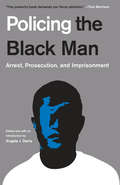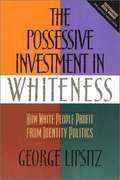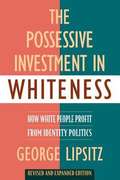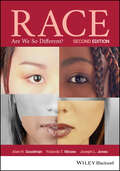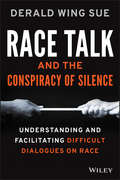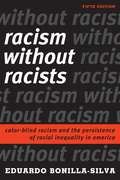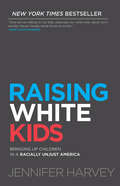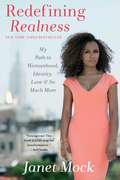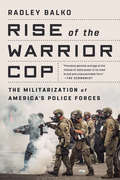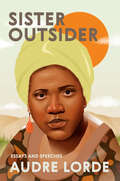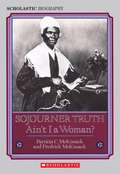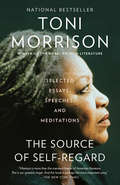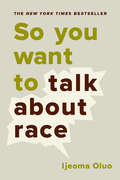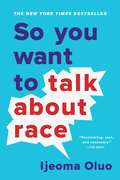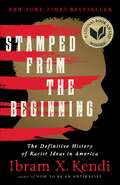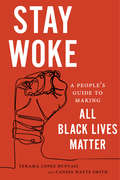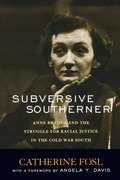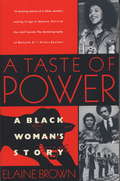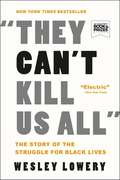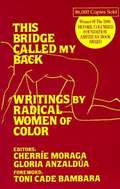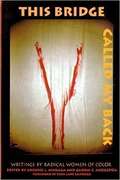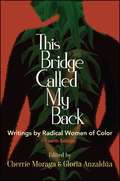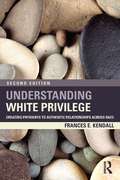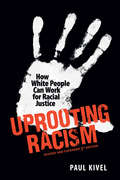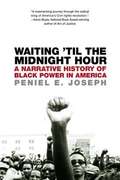Special Collections
Anti-Racism 101
- Table View
- List View
Policing the Black Man
by Angela J. DavisA comprehensive, readable analysis of the key issues of the Black Lives Matter movement, this thought-provoking and compelling anthology features essays by some of the nation’s most influential and respected criminal justice experts and legal scholars.Policing the Black Man explores and critiques the many ways the criminal justice system impacts the lives of African American boys and men at every stage of the criminal process, from arrest through sentencing. Essays range from an explication of the historical roots of racism in the criminal justice system to an examination of modern-day police killings of unarmed black men. The contributors discuss and explain racial profiling, the power and discretion of police and prosecutors, the role of implicit bias, the racial impact of police and prosecutorial decisions, the disproportionate imprisonment of black men, the collateral consequences of mass incarceration, and the Supreme Court’s failure to provide meaningful remedies for the injustices in the criminal justice system. Policing the Black Man is an enlightening must-read for anyone interested in the critical issues of race and justice in America.
The Possessive Investment in Whiteness
by George LipsitzHard-hitting expose of American systemic societal racism.
The Possessive Investment in Whiteness
by George LipsitzIn this unflinching look at white supremacy, George Lipsitz argues that racism is a matter of interests as well as attitudes, a problem of property as well as pigment. Above and beyond personal prejudice, whiteness is a structured advantage that produces unfair gains and unearned rewards for whites while imposing impediments to asset accumulation, employment, housing, and health care for minorities. Reaching beyond the black/white binary, Lipsitz shows how whiteness works in respect to Asian Americans, Latinos, and Native Americans. Lipsitz delineates the weaknesses embedded in civil rights laws, the racial dimensions of economic restructuring and deindustrialization, and the effects of environmental racism, job discrimination and school segregation. He also analyzes the centrality of whiteness to U. S. culture, and perhaps most importantly, he identifies the sustained and perceptive critique of white privilege embedded in the radical black tradition. This revised and expanded edition also includes an essay about the impact of Hurricane Katrina on working class Blacks in New Orleans, whose perpetual struggle for dignity and self determination has been obscured by the city's image as a tourist party town.
Race
by Alan H. Goodman and Yolanda T. Moses and Joseph L. JonesThe second edition of the bestselling title on modern notions of race, providing timely examination of perspectives on race, racism, and human biological variation In this fully updated second edition of this popular text on the study of race, Alan Goodman, Yolanda Moses, and Joseph Jones take a timely look at modern ideas surrounding race, racism, and human diversity, and consider the ways that ideas about race have changed over time.
New material in the second edition covers recent history and emerging topics in the study of race. The second edition has also been updated to account for advancements in the study of human genetic variation, which provide further evidence that race is an entirely social phenomenon. RACE compels readers to carefully consider their own ideas about race and the role that race plays in the world around them.
Race Talk and the Conspiracy of Silence
by Derald Wing SueLearn to talk about race openly, honestly, and productively Most people avoid discussion of race-related topics because ofthe strong emotions and feelings of discomfort that inevitablyaccompany such conversations. Rather than endure the conflict ofracial realities, many people choose instead to avoid the topicaltogether, or remain silent when it is raised. Race Talk andthe Conspiracy of Silence: Understanding and Facilitating DifficultDialogues on Race puts an end to that dynamic by sharingstrategies for smoothing conversations about race in a productivemanner.A guide for facilitating and participating in difficultdialogues about race, author Derald Wing Sue - aninternationally recognized expert on multiculturalism, diversity,and microaggressions - explores the characteristics,dynamics, and meaning behind discussions about race as well as thehidden "ground rules" that inhibit honest and productive dialogue.Through emotional and visceral examples, this book explains whyconversations revolving around racial issues are so difficult, andprovides guidelines, techniques, and advice for navigating andleading honest and forthright discussions. Readers will develop astronger ability to build rapport with people unlike themselves,and discover how not talking about race impacts society as awhole.Overcome and make visible the fears associated with racetalkLearn practical ideas for talking openly about raceFacilitate and navigate discussion with expert strategyExamine the hidden rules that govern race talkUnderstand the benefits of successful conversationsDiscussions about race do not have to result in disastrousconsequences, and can in fact be highly beneficial to all partiesinvolved. It's important that people have the ability to converseopenly and honestly with their students, colleagues, children, andneighbors, and Race Talk provides the path for achievingthis goal.
Racism Without Racists
by Eduardo Bonilla-SilvaEduardo Bonilla-Silva's acclaimed Racism without Racists documents how, beneath our contemporary conversation about race, there lies a full-blown arsenal of arguments, phrases, and stories that whites use to account for--and ultimately justify--racial inequalities.
The fifth edition of this provocative book makes clear that color blind racism is as insidious now as ever.
It features new material on our current racial climate, including the Black Lives Matter movement; a significantly revised chapter that examines the Obama presidency, the 2016 election, and Trump's presidency; and a new chapter addressing what readers can do to confront racism--both personally and on a larger structural level.
Raising White Kids
by Jennifer HarveyThis New York Times best-selling book is a guide for families, educators, and communities to raise their children to be able and active anti-racist allies.With a foreword by Tim Wise, Raising White Kids is for families, churches, educators, and communities who want to equip their children to be active and able participants in a society that is becoming one of the most racially diverse in the world while remaining full of racial tensions. For white people who are committed to equity and justice, living in a nation that remains racially unjust and deeply segregated creates unique conundrums.These conundrums begin early in life and impact the racial development of white children in powerful ways. What can we do within our homes, communities and schools? Should we teach our children to be "colorblind"? Or, should we teach them to notice race? What roles do we want to equip them to play in addressing racism when they encounter it? What strategies will help our children learn to function well in a diverse nation?Talking about race means naming the reality of white privilege and hierarchy. How do we talk about race honestly, then, without making our children feel bad about being white? Most importantly, how do we do any of this in age-appropriate ways?While a great deal of public discussion exists in regard to the impact of race and racism on children of color, meaningful dialogue about and resources for understanding the impact of race on white children are woefully absent. Raising White Kids steps into that void."Most white Americans didn't get from our own families the concrete teaching and modeling we needed to be active in the work of racial justice ourselves, let alone to feel equipped now to talk about race with and teach anti-racism to our children. There is so much we need to learn and it's urgent that we do so. But the good news is: we can," says Jennifer Harvey.
Redefining Realness
by Janet MockIn 2011, Marie Claire magazine published a profile of Janet Mock in which she stepped forward for the first time as a trans woman. Those twenty-three hundred words were life-altering for the People.com editor, turning her into an influential and outspoken public figure and a desperately needed voice for an often voiceless community. In these pages, she offers a bold and inspiring perspective on being young, multicultural, economically challenged, and transgender in America. Welcomed into the world as her parents' firstborn son, Mock decided early on that she would be her own person--no matter what. She struggled as the smart, determined child in a deeply loving yet ill-equipped family that lacked the money, education, and resources necessary to help her thrive. Mock navigated her way through her teen years without parental guidance, but luckily, with the support of a few close friends and mentors, she emerged much stronger, ready to take on--and maybe even change--the world.
This powerful memoir follows Mock's quest for identity, from an early, unwavering conviction about her gender to a turbulent adolescence in Honolulu that saw her transitioning during the tender years of high school, self-medicating with hormones at fifteen, and flying across the world alone for sex reassignment surgery at just eighteen. With unflinching honesty, Mock uses her own experience to impart vital insight about the unique challenges and vulnerabilities of trans youth and brave girls like herself. Despite the hurdles, Mock received a scholarship to college and moved to New York City, where she earned a master's degree, enjoyed the success of an enviable career, and told no one about her past. She remained deeply guarded until she fell for a man who called her the woman of his dreams. Love fortified her with the strength to finally tell her story, enabling her to embody the undeniable power of testimony and become a fierce advocate for a marginalized and misunderstood community. A profound statement of affirmation from a courageous woman, Redefining Realness provides a whole new outlook on what it means to be a woman today, and shows as never before how to be authentic, unapologetic, and wholly yourself.
Rise of the Warrior Cop
by Radley BalkoThe last days of colonialism taught America's revolutionaries that soldiers in the streets bring conflict and tyranny. As a result, our country has generally worked to keep the military out of law enforcement. But according to investigative reporter Radley Balko, over the last several decades, America's cops have increasingly come to resemble ground troops. The consequences have been dire: the home is no longer a place of sanctuary, the Fourth Amendment has been gutted, and police today have been conditioned to see the citizens they serve as an other-an enemy.Today's armored-up policemen are a far cry from the constables of early America. The unrest of the 1960s brought about the invention of the SWAT unit-which in turn led to the debut of military tactics in the ranks of police officers. Nixon's War on Drugs, Reagan's War on Poverty, Clinton's COPS program, the post-9/11 security state under Bush and Obama: by degrees, each of these innovations expanded and empowered police forces, always at the expense of civil liberties. And these are just four among a slew of reckless programs.In Rise of the Warrior Cop, Balko shows how politicians' ill-considered policies and relentless declarations of war against vague enemies like crime, drugs, and terror have blurred the distinction between cop and soldier. His fascinating, frightening narrative shows how over a generation, a creeping battlefield mentality has isolated and alienated American police officers and put them on a collision course with the values of a free society.
Sister Outsider
by Audre Lorde and Cheryl ClarkePresenting the essential writings of black lesbian poet and feminist writer Audre Lorde, SISTER OUTSIDER celebrates an influential voice in twentieth-century literature. In this charged collection of fifteen essays and speeches, Lorde takes on sexism, racism, ageism, homophobia, and class, and propounds social difference as a vehicle for action and change. Her prose is incisive, unflinching, and lyrical, reflecting struggle but ultimately offering messages of hope. This commemorative edition includes a new foreword by Lorde scholar and poet Cheryl Clarke, who celebrates the ways in which Lorde's philosophies resonate more than twenty years after they were first published. These landmark writings are, in Lorde's own words, a call to "never close our eyes to the terror, to the chaos which is Black which is creative which is female which is dark which is rejected which is messy which is. ..."
Reviews: "...it's been almost a quarter of a century since Audre Lorde's essays and speeches in Sister Outsider made an indelible mark on 20th-century literature. But the words of the black lesbian feminist poet seem as lyrical and unforgettable, and, sadly, as relevant today as when she first tackled everything from racism and homophobia to ageism and class dichotomies. A must-have book that every lesbian should read."--Curve Editor's Pick. "Lorde was a brilliant feminist poet and intellectual whose theories on the power of embracing our internal contradictions as well as the differences between people and groups is the way to powerful coalition building and social progress." --New York Post, Sunday. "Poet and librarian Lorde collected 15 of her finest essays and speeches in this 1984 volume. With her poet's command of language, she addresses sexism, racism, black women, black lesbians, eroticism, and more. Still powerful."--Library Journal, Starred Review. "Audre Lorde is a passionate sage. I say 'is' and not 'was' because her keen insights continue to provoke and sustain us and give us courage. The reissue of this book is a gift to longtime admirers and to new readers who have yet to discover the power and grace and splendid audacity of Audre Lorde."--Valerie Miner, author of After Eden and professor of feminist studies at Stanford University. "[Lorde's] works will be important to those truly interested in growing up sensitive, intelligent, and aware."--New York Times.
Sojourner Truth
by Patricia C. Mckissack and Fredrick MckissackThis 1993 Coretta Scott King Honor Book chronicles the life of African-American Sojourner Truth, a nineteenth-century preacher, abolitionist, and activist for the rights of African Americans and women.
The Source of Self-Regard
by Toni MorrisonArguably the most celebrated and revered writer of our time now gives us a new nonfiction collection--a rich gathering of her essays, speeches, and meditations on society, culture, and art, spanning four decades.
The Source of Self-Regard is brimming with all the elegance of mind and style, the literary prowess and moral compass that are Toni Morrison's inimitable hallmark. It is divided into three parts: the first is introduced by a powerful prayer for the dead of 9/11; the second by a searching meditation on Martin Luther King Jr., and the last by a heart-wrenching eulogy for James Baldwin.
In the writings and speeches included here, Morrison takes on contested social issues: the foreigner, female empowerment, the press, money, "black matter(s)," and human rights. She looks at enduring matters of culture: the role of the artist in society, the literary imagination, the Afro-American presence in American literature, and in her Nobel lecture, the power of language itself.
And here too is piercing commentary on her own work (including The Bluest Eye, Sula, Tar Baby, Jazz, Beloved, and Paradise) and that of others, among them, painter and collagist Romare Bearden, author Toni Cade Bambara, and theater director Peter Sellars.
In all, The Source of Self-Regard is a luminous and essential addition to Toni Morrison's oeuvre.
A New York Times Bestseller
So You Want to Talk About Race
by Ijeoma OluoIn this breakout book, Ijeoma Oluo explores the complex reality of today's racial landscape--from white privilege and police brutality to systemic discrimination and the Black Lives Matter movement--offering straightforward clarity that readers need to contribute to the dismantling of the racial divide
In So You Want to Talk About Race, Editor at Large of The Establishment Ijeoma Oluo offers a contemporary, accessible take on the racial landscape in America, addressing head-on such issues as privilege, police brutality, intersectionality, micro-aggressions, the Black Lives Matter movement, and the "N" word. Perfectly positioned to bridge the gap between people of color and white Americans struggling with race complexities, Oluo answers the questions readers don't dare ask, and explains the concepts that continue to elude everyday Americans.
Oluo is an exceptional writer with a rare ability to be straightforward, funny, and effective in her coverage of sensitive, hyper-charged issues in America. Her messages are passionate but finely tuned, and crystalize ideas that would otherwise be vague by empowering them with aha-moment clarity. Her writing brings to mind voices like Ta-Nehisi Coates and Roxane Gay, and Jessica Valenti in Full Frontal Feminism, and a young Gloria Naylor, particularly in Naylor's seminal essay "The Meaning of a Word."
So You Want to Talk About Race
by Ijeoma OluoIn this New York Times bestseller, Ijeoma Oluo offers a hard-hitting but user-friendly examination of race in America
Widespread reporting on aspects of white supremacy--from police brutality to the mass incarceration of Black Americans--has put a media spotlight on racism in our society. Still, it is a difficult subject to talk about. How do you tell your roommate her jokes are racist? Why did your sister-in-law take umbrage when you asked to touch her hair--and how do you make it right? How do you explain white privilege to your white, privileged friend?
In So You Want to Talk About Race, Ijeoma Oluo guides readers of all races through subjects ranging from intersectionality and affirmative action to "model minorities" in an attempt to make the seemingly impossible possible: honest conversations about race and racism, and how they infect almost every aspect of American life.
A New York Times Bestseller
Stamped From the Beginning
by Ibram X. KendiSome Americans cling desperately to the myth that we are living in a post-racial society, that the election of the first Black president spelled the doom of racism. In fact, racist thought is alive and well in America--more sophisticated and more insidious than ever. And as award-winning historian Ibram X. Kendi argues in Stamped from the Beginning, if we have any hope of grappling with this stark reality, we must first understand how racist ideas were developed, disseminated, and enshrined in American society.
In this deeply researched and fast-moving narrative, Kendi chronicles the entire story of anti-Black racist ideas and their staggering power over the course of American history. Stamped from the Beginning uses the life stories of five major American intellectuals to offer a window into the contentious debates between assimilationists and segregationists and between racists and anti racists. From Puritan minister Cotton Mather to Thomas Jefferson, from fiery abolitionist William Lloyd Garrison to brilliant scholar W.E.B. Du Bois to legendary anti-prison activist Angela Davis, Kendi shows how and why some of our leading proslavery and pro-civil rights thinkers have challenged or helped cement racist ideas in America.
Contrary to popular conceptions, racist ideas did not arise from ignorance or hatred. Instead, they were devised and honed by some of the most brilliant minds of each era. These intellectuals used their brilliance to justify and rationalize deeply entrenched discriminatory policies and the nation's racial disparities in everything from wealth to health. And while racist ideas are easily produced and easily consumed, they can also be discredited. In shedding much-needed light on the murky history of racist ideas, Stamped from the Beginning offers us the tools we need to expose them--and in the process, gives us reason to hope.
Winner of the National Book Award
A New York Times Bestseller
Stay Woke
by Candis Watts Smith and Tehama Lopez BunyasiThe essential guide to understanding how racism works and how racial inequality shapes black lives, ultimately offering a road-map for resistance for racial justice advocates and antiracists When #BlackLivesMatter went viral in 2013, it shed a light on the urgent, daily struggles of black Americans to combat racial injustice. The message resonated with millions across the country. Yet many of our political, social, and economic institutions are still embedded with racist policies and practices that devalue black lives. Stay Woke directly addresses these stark injustices and builds on the lessons of racial inequality and intersectionality the Black Lives Matter movement has challenged its fellow citizens to learn.In this essential primer, Tehama Lopez Bunyasi and Candis Watts Smith inspire readers to address the pressing issues of racial inequality, and provide a basic toolkit that will equip readers to become knowledgeable participants in public debate, activism, and politics. This book offers a clear vision of a racially just society, and shows just how far we still need to go to achieve this reality. From activists to students to the average citizen, Stay Woke empowers all readers to work toward a better future for black Americans.
Subversive Southerner
by Catherine Foslmccarty braden is a southern white woman who in the 1940s broke from her segregationist past and became a lifelong crusader to awaken the white southerners to racial injustice.
A Taste of Power
by Elaine BrownBrown's account of her life at the highest levels of the Black Panther party's hierarchy. More than a journey through a turbulent time in American history, this is the story of a black woman's battle to define herself.
They Can't Kill Us All
by Wesley LoweryOne of the Most Anticipated Books of Fall 2016 -- Publishers WeeklyOne of the Most Anticipated Books of Fall 2016--Elle11 Fall Books We Can't Wait to Read -- Seattle TimesA best book of fall 2016--Boston GlobeOne of the St. Louis Post-Dispatch's 20 Books to Watch, fall 2016One of Vulture's "7 Books You Need to Read this November"A deeply reported book that brings alive the quest for justice in the deaths of Michael Brown, Tamir Rice, and Freddie Gray, offering both unparalleled insight into the reality of police violence in America and an intimate, moving portrait of those working to end itConducting hundreds of interviews during the course of over one year reporting on the ground, Washington Post writer Wesley Lowery traveled from Ferguson, Missouri, to Cleveland, Ohio; Charleston, South Carolina; and Baltimore, Maryland; and then back to Ferguson to uncover life inside the most heavily policed, if otherwise neglected, corners of America today.In an effort to grasp the magnitude of the repose to Michael Brown's death and understand the scale of the problem police violence represents, Lowery speaks to Brown's family and the families of other victims other victims' families as well as local activists. By posing the question, "What does the loss of any one life mean to the rest of the nation?" Lowery examines the cumulative effect of decades of racially biased policing in segregated neighborhoods with failing schools, crumbling infrastructure and too few jobs.Studded with moments of joy, and tragedy, They Can't Kill Us All offers a historically informed look at the standoff between the police and those they are sworn to protect, showing that civil unrest is just one tool of resistance in the broader struggle for justice. As Lowery brings vividly to life, the protests against police killings are also about the black community's long history on the receiving end of perceived and actual acts of injustice and discrimination. They Can't Kill Us All grapples with a persistent if also largely unexamined aspect of the otherwise transformative presidency of Barack Obama: the failure to deliver tangible security and opportunity to those Americans most in need of both.
This Bridge Called My Back
by Toni Cade Bambara and Gloria Anzaldúa and Cherríe MoragaThis Bridge Called My Back intends to reflect an uncompromised definition of feminism by women of color in the United States. Containing prose, poetry, personal narrative and analysis by Afro-American, Asian American, Latina, and Native American women, This Bridge Called My Back is divided into six powerful sections. * Children passing in the streets The Roots of Our Radicalism * Entering the lives of others Theory in the Flesh * And when you leave, take your pictures with you Racism in the Women's Movement * Between the lines On Culture, Class and Homophobia * Speaking in tongues The Third World Woman Writer * El Mundo Zurdo The Vision
This Bridge Called My Back
by Cherrie Moraga and Gloria AnzaldúaWritings by radical women of color.
This Bridge Called My Back
by Gloria Anzaldúa and Cherríe MoragaOriginally released in 1981, This Bridge Called My Back is a testimony to women of color feminism as it emerged in the last quarter of the twentieth century. Through personal essays, criticism, interviews, testimonials, poetry, and visual art, the collection explores, as coeditor Cherríe Moraga writes, “the complex confluence of identities—race, class, gender, and sexuality—systemic to women of color oppression and liberation.”
Reissued here, nearly thirty-five years after its inception, the fourth edition contains an extensive new introduction by Moraga, along with a previously unpublished statement by Gloria Anzaldúa. The new edition also includes visual artists whose work was produced during the same period as Bridge, including Betye Saar, Ana Mendieta, and Yolanda López, as well as current contributor biographies. Bridge continues to reflect an evolving definition of feminism, one that can effectively adapt to, and help inform an understanding of the changing economic and social conditions of women of color in the United States and throughout the world.
Understanding White Privilege
by Frances KendallKnowingly and unknowingly we all grapple with race every day. Understanding White Privilege delves into the complex interplay between race, power, and privilege in both organizations and private life. It offers an unflinching look at how ignorance can perpetuate privilege, and offers practical and thoughtful insights into how people of all races can work to break this cycle. Based on thirty years of work in diversity and colleges, universities, and corporations, Frances Kendall candidly invites readers to think personally about how race — theirs and others’ — frames experiences and relationships, focusing squarely on white privilege and its implications for building authentic relationships across race. This much-anticipated revised edition includes two full new chapters, one on white women and another extending the discussion on race. It continues the important work of the first, deepening our knowledge of the recurring history on which cross-race relationships issues exist. Kendall’s book provides readers with a more meaningful understanding of white privilege and equips them with strategies for making personal and organizational changes.
Uprooting Racism
by Paul KivelIn 2008, the United States elected its first black president, and recent polls show that only 22 percent of white people in the US believe that racism is a major societal problem. On the surface, it may seem to be in decline. However the evidence of discrimination persists throughout our society. Segregation and inequalities in education, housing, health care and the job market continue to be the norm. Post 9/11, increased insecurity and fear have led to an epidemic of the scapegoating and harassment of people of color. Uprooting Racism offers a framework for understanding institutional racism. It provides practical suggestions, tools, examples and advice on how white people can intervene in interpersonal and organizational situations to work as allies for racial justice. Completely revised and updated, this expanded third edition directly engages the reader through questions, exercises and suggestions for action, and takes a detailed look at current issues such as affirmative action, immigration and health care. It also includes a wealth of information about specific cultural groups such as Muslims, people with mixed-heritage, Native Americans, Jews, recent immigrants, Asian Americans, and Latino/as. Previous editions of Uprooting Racism have sold more than 50,000 copies. Accessible, personal, supportive and practical, this book is ideal for students, community activists, teachers, youth workers and anyone interested in issues of diversity, multiculturalism and social justice.
Waiting 'Til the Midnight Hour
by Peniel E. JosephThe history of the large-scale political developments that shaped the course of the Black Power movement in America
